July 20, 2008 (Sunday)
The Lord’s Hand in my Life: A gentle reminder not to judge a person or their situation by their outward appearance.
This morning we rolled out of bed and made French toast and fruit salad for breakfast for Deanna to thank her again for guiding us on our Black Sea adventure. We had a lot of fun the past couple of days lying on the beach having fun.
Whitney S. got an email from her mom this morning. Whitney told me that her mom had seen on my blog that Andrea has tuberculosis and that we need to be careful because it is more serious than we think. After looking it up on Wikipedia we found out it is highly contagious and if not properly treated 50 percent of people die if they are not treated. We all laughed when we listed all the things we need to have checked out by the doctor. When we get back…Oh the joys. We’ll all hope for the best, but I guess that is the price that comes with working with sick kids all day. Hopefully the Lord will keep me healthy throughout the remainder of my time here.
Right after breakfast we headed for the train station and prepared ourselves for a ten hour train ride back to Iasi. When we walked into the train I don’t think I have ever been hit with a stronger stench/feeling of stuffiness/heat in my life. I felt like I was suffocating and unable to breathe. Everyone that was already on the train was drenched in sweat. The men had their shirts off and women were wearing as little clothing as possible. Then to top off the experience Whitney S. and I were seated directly across from a family that had a huge suitcase planted at out feet. We had about an inch of leg room. Then there was a blanket they had tagged up in the window to block the sun, but it kept falling on me and I was so so hot. Needless to say I was cranky – really cranky. Romanians aren’t real considerate all the time.
The first hour of the train ride was miserable. Whitney and I threw our layers off in an attempt to cool down – then eventually they turned the air conditioning on. I don’t know why they hadn’t done that before. I don’t understand! We are blessed to have air conditioning in America everywhere we go – so blessed!
The rest of the train ride was really long. Whitney S. and I finished the book we had been reading for classes. Boy were we glad…it was starting to get boring. In between our readings the family across from us were about as obnoxious as they could possibly be. Not only did they end up drinking 6 – 2L bottles of liquor, but they even gave some to their two year old to drink. We couldn’t believe it. Drugs and alcohol go at any age here. No big deal…I kept looking across at the family and they looked so miserable. The poor mom was trying to take care of the kids and her husband and her husband’s brother and wife would step off at every stop for a smoke break or to buy more liquor. I sat there and wondered how much of their income went to alcohol. Then I just sat there and contemplated how grateful I was for the gospel and for being a member of The Church of Jesus Christ of Latter-day Saints. It’s hard for me to see people that have such sad lives when I feel like mine is so amazing because of my faith. Of course I have hard times, but I can handle them because I understand who I am, where I’m going and why I’m here on this earth. It makes all the difference in the world to understand your purpose. The family that sat across from me had no clue…
After Whitney and I finished our book, I decided to read Odyssey of a Romanian Street Child by Catalin Dobrisan and John Kachelmyer. I wanted to finish my 1000 pages of reading we have to do while we’re out here. The book was actually really good and a really easy read. I finished it on the remainder of the ride. There were several points throughout the book that made me really analyze how I look at people and their situations. It helped remind me to never judge a person’s situation by their outward appearance. Here are some of my favorite parts – they are great points to contemplate. If anyone gets a chance they should read the book. So many of us are so blessed and we complain so much about our lives (me included) and we fail to see how much we have in comparison to so many.
• “Others, knowing that many street kids exist as parasites and do not want rehabilitation, have criticized those who have persisted in carrying food to them without expecting a positive response in return. It is much like the Christian evangelists who will not preach unless they are guaranteed some converts. But the kindness of continuing to feed the children, even without apparent results, must continue. Jesus never told his followers that the hungry should be fed only if they respond. The act of kindness itself has its effects.”(p.141)
• “Most children nowadays no longer know the Ten Commandments, and their concept of God is obscure. Workers with whom I am in contact in the United States are reporting that they come in contact increasingly with children who have never heard of Jesus except as a curse word. They have never been in church and have no idea of what goes on in one.” (p.149)
• “So, looking at him sprawled on the sidewalk with his bag of aurolac or sitting against the wall in the train station, one might see only a grime-covered, drugged, revolting figure. How he got in that condition is not obvious. A thieving street kid? He had his family, affection and childhood stolen from him! A drugged disgrace? How could he help but seek solace in any form available that would help him forget his circumstances? Imagine passing the ages of six, seven, eight or nine all alone out on the streets. The public may view him with distaste, but there are those walking around in plain daylight who should be incarcerated for putting him there.
‘Thus, I never told a child he was a sinner who ought to repent for stealing, for immorality, for prostitution, for drugs or whatever other unpalatable activity he was engaged in. I have watched several well-meaning workers grabbing the bags of aurolac from children or setting their bags of aurolac on fire. I have watched them snatch the cigarettes out of children’s mouths, saying, ‘You don’t want that anymore!’ I never did that! The crime committed against that child must be atoned for first. How can that child understand the love of Jesus if I don’t love him first? The grime and condition these children are in never repelled me, and I have been closer to their lice than I indicated in the preface. But after all public opinion has been expressed, the fact remains that the children are the victims, not the guilty. Whether or not they want religion depends on how we live it before them.” (p.155)
• “Young prostitutes, whether girl or boy, are not going to be rehabilitated by telling them that what they are doing is sinful and they need to be saved – to get right with God…When the women caught in the act of adultery was brought to Jesus, she did not need to be told that what she was doing was wrong. The value system of her day taught her that.” (p.149)
• “When I brought new children into our home I never confronted them directly with religion. Regligion was a very natural and especially practical part of our lives; it was not a theological concept but something the child could comprehend and say, ‘Hey, I need that.’ So, we ate, we worked, we slept and we believed. It was all a natural part of living and not a forced ‘now we are going to pray; king of thing.” ((p.151)
• “I see the wasted life of a very intelligent man – a life that at this point is going nowhere and has no purpose. If he had never been beaten, raped mistreated and abandoned, he would today be a normal boy just finishing high school. As it is, Robert has only completed fourth grade.” (p.165)
• “There are many Christians who would cluck their tongues over this young man’s escapades: a boy prostitute? Horrible! Porn film star? My God! And I didn’t mention he had used heroin and was once hospitalized for alcohol intoxication. Robert was also the best pickpocket in Bucharest and a master thief. So there is quite a list against him. Yet, something nags at me. It is that verse in John 9:2. ‘Who sinned? This [young] man or his parents?
‘I ask: Who will answer for all this mess in the Day of Judgment? A boy is cruelly thrust out of his family at age six. When he is supposed to be enjoying his childhood – those years when he is supposed to be developing social skills, receiving love and guidance from his parents and gaining a conscience to tell him right from wrong – during those years he is learning other things: dark, unsavory things. Someone is going to pay. And I can tell you this: Robert is not going to foot the entire bill alone.
‘What will happen to Robert in the judgment? Here is where I am so pleased that God did not make us judges. In fact, His express word to me when I came to Romania was, ‘Do not judge any of these children. Just help them!’” (p. 165)
• “One thing that was hard to comprehend was that Daddy actually respected us boys. It was not hard to understand that he was friendly; it was a little more difficult to realize he had affection for us; but respect? People had always looked down on us as trash – the lowest dregs of society. Daddy wanted us to feel that we were someone special. It made no difference what we had done; he had the same respect for all of us – even the boy prostitutes and the one who had committed murder.” (p.128)
• “I asked myself many times. ‘Did I really have to go through all I went through? Was it really necessary to fulfill some mystical purpose – the abuse, the beatings, the hunger, the misery? Why wasn’t I born into a normal family?’ Only God has the answer to all of this.
‘Then the companion question comes, ‘Why was it only I who was chosen to escape from my gang?’ IT would seem to be divine favor. Many others had the same chance, but many threw it away. I had the chance, and I grasped it.’” (p.139)
• “As I had already known when living in the streets, it was senseless to attempt to understand the meaning of life while in that condition. Life under those circumstances had no meaning. The greatest artistic masterpiece in the world has no meaning in a dark room.
‘In regard to that, I must clarify that the painting may have ‘value’ in the dark, but it has no ‘meaning’ without light. In the same way, the street children are not without value as many might think. It is just that there is no meaning to their existence while they are living in the darkness. Because they have value, a few are willing to sacrifice their lives to help them.’” (p.127)
Tuesday, July 22, 2008
Subscribe to:
Post Comments (Atom)








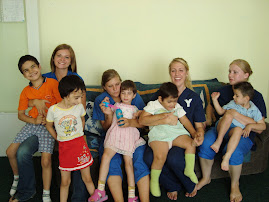


























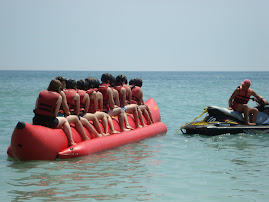





























































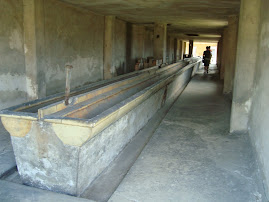







































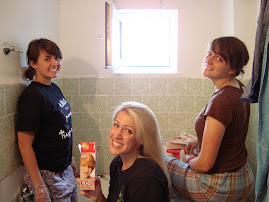





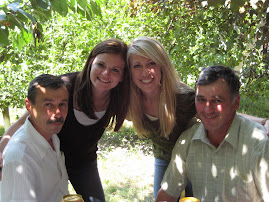

























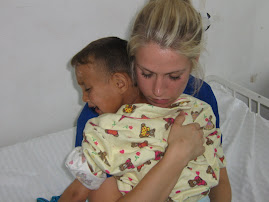





















































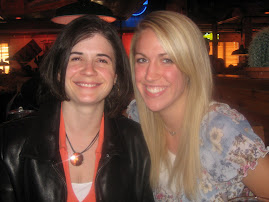
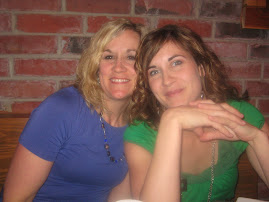
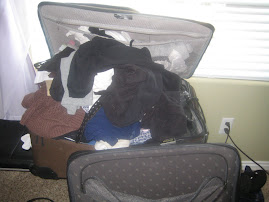
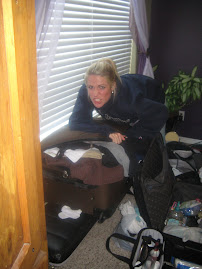
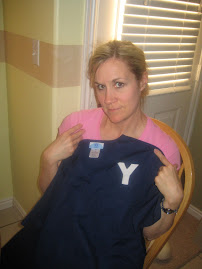
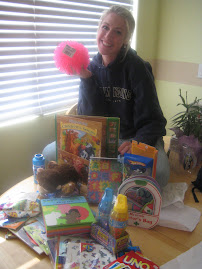

No comments:
Post a Comment